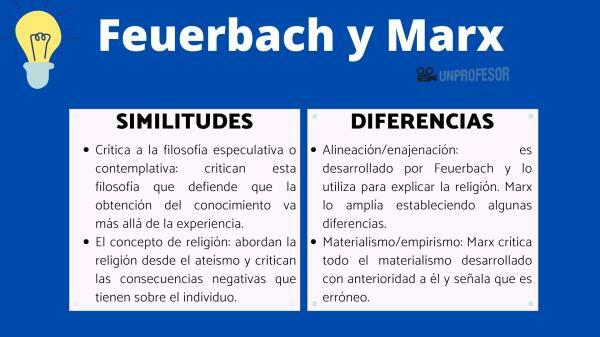FEUERBACH and MARX: similarities and differences [Summary + videos!]

In class today we are going to study the Similarities and differences between Feuerbach and Marx, two of the most important philosophers in contemporary history. The first influenced some of the theses of the second, such as the concept of religion. However, Marx disagreed with and criticized many of Feuerbach's postulates in his work The thesis on Feuerbach (1845), as the concept of materialism.
If you want to know more about the similarities and differences between these two German philosophers, keep reading this lesson because in a PROFESOR we explain them to you. Let's start!
Between Feuerbach and Marx the following similarities stand out
Criticism of speculative or contemplative philosophy
Both philosophers criticize this philosophy that defends that obtaining philosophical knowledge goes beyond individual's own experience and which establishes that the attainment of truth and knowledge is based on the principle of apriority (knowledge is born not generated from experience), thus departing from the principles of observation and experimentation.
In this sense, Feuerbach, and especially Marx, defend the philosophy of praxis (action/practice), according to, we must put aside speculation and walk towards practice, which is what gives us knowledge. Thus, praxis is considered as a practice of life through which theories, interpretive frameworks and knowledge are generated. It is, therefore, an action that can transform life and the society in which man lives, as well as, condition the theoretical activity.
The concept of religion
Another of the similarities between Feuerbach and Marx focuses on the concept of religion. And it is that our two protagonists approach religion from the atheism and criticize the negative consequences they have on the individual.
In this sense, both Feuerbach Like Marx, they have a very similar concept of religion. Highlighting the proposal of the former in his work The essence of Christianity (1841), which is followed by Marx. In this way, both defend that God does not exist, that it is an invention of the human being with the aim of explain what is inexplicable and is used to legitimize our fears, concerns and ignorances.
Thus, following this line, Feuerbach points out that man first he invented God to later deny him, that all the “perfect” ideals of man himself were projected on him and that the more the figure of God is magnified, the more impoverishes the individual. Likewise, he establishes that God is a figure created to set guidelines for behavior or moral codes that are out of logic and that stand as castrating elements that prevent freedom. That is why religion must be overcome because it is negative for the human being.
"The man creates religion, it is born from his urgency and then becomes independent, to present himself as the creator of everything that exists ”. Feuerbach
On the other hand, Marx defends Feuerbach's proposal and adds the fact that religion has historically been on the side of powerful classes and, therefore, helping to perpetuate the power of these and the class system. For this reason, for Marx it is necessary to suppression of religion (“the opium of the people”) and this overcoming involves changing the economic system and putting an end to the class system.
Among the main differences between Feuerbach and Marx, the following stand out:
The concept of alienation/alienation
The concept of alignment is developed by Feuerbach and used to explain religion: how man renounces his own being / nature to create a being in which everything that cannot be is projected, that is, man alienates himself in God. So God is a product created that ends up dominating the creator or producer of him (man): "It is not God who creates man but man creates God"
For its part, Marx takes this concept and expands it by establishing some differences. Thus, for Marx, alienation is not in consciousness (as Feuerbach defended), but in reality itself:
“Feuerbach dilutes the religious essence in the human essence. But the human essence is not something abstract inherent to each individual. It is, in its reality, the set of social relations.” (Karl Marx)
Thus, for Marx, man not only alienates himself in God but in the job: When he, as a worker, loses control of what he produces with his effort and becomes a benefit for capital, having three negative consequences for the worker:
- The effort or labor becomes a commodity, something that is sold.
- The effort is not controlled by the one who produces it but by another.
- The producer of the product is disconnected: the effort is not taken as his own and goes from being a satisfaction to a sacrifice.
materialism/empiricism
We continue to learn about the differences between Feuerbach and Marx by talking about a very clear concept. And it is that in his work Theses on Feuerbach (1945) Critical Marx all the materialism developed before it and point out that it is wrong. Setting:
"The fundamental defect of all previous/traditional materialism - including Feuerbach's - is that it only conceives of things (the object), reality, materiality, is only grasped in the form of an object or contemplation (sensible intuition), but not as a human sensory activity, not as a practice, not as a subjective way”
For Marx, all of the above had been based on a contemplative materialism and static in which ideas are not based on practicality. Similarly, he states that Feuerbach was not able to think of the world as a reality with a subjective matter linked to a story.
In other words, for Marx the fact that everything starts from a matter is not important, but what influences the history, the material conditions (what determines society: what we produce, technology, the economy...) and, therefore, to understand the world we must understand the materiality of relationships economics, technology… of our society. Hence, he tells us that philosophers have always tried to interpret the various ways of the world, but that really what it is about is understanding and transforming it.
Finally, in Feuerbach we observe how he does not introduce the human being and society into history, takes it out of historical periods, introduces it into consciousness and links it in a succession of religions.



